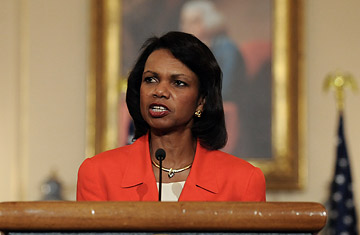
US Secretary of State Condoleezza Rice.
(7 of 17)
CUOMO: I resist the suggestion that you can come anywhere near equating Theodore and Franklin Roosevelt, even given the awesome expertise we have here. Theodore Roosevelt did follow McKinley, Cleveland, in the strengthening of the Presidency which culminated in Woodrow Wilson who really seized it. And he did make an interpolation that was different than the first century when he said, I'm going to start regulating businesses but he didn't positively help people through the national government. And after Theodore Roosevelt the Republicans abandoned him. And, so, you get to Hoover who was a wonderful man who's never been given his due by history, a gentle, intelligent, generous man who didn't take a salary and who thought he was doing the right thing who abandoned any notion that the government should intervene to help poor people in a depression and said we won't do it. Roosevelt defeated him because of that and it was Franklin Roosevelt who made the first initial step toward an activist national government that helps people: Social Security, child labor law. That was Franklin Roosevelt. [unintelligible]
KEARNS-GOODWIN: [unintelligible].
CUOMO: No, no, no, I'm still John the 23rd.
[Laughter]
—RATHER: When I mentioned Churchill you said we were going to discuss foreign leaders later on. As far as I know [unintelligible].
[simultaneous conversation]
ROSE: We are also going to discuss religion later. Let me just come to a Republican, two Republicans but first one that that you have occasionally spoken well of and just put it in the context even though he might not be your choice for number one, Richard Nixon, for greatness.
CUOMO: I think if you could excise Watergate, which regrettably we can't, but if you could take Watergate out, it's hard for me, as a Democrat, who believes in a kind of progressive effort toward synergism, not to make him one of the greats, not because of his foreign policy, which I think most people would agree was intelligent, pragmatic, broke through on China and in various other ways, but domestic policy. He was one of the best Democratic Presidents in modern history. Probably better than Carter, probably better in some ways than Clinton in terms of progressive use of government to help working people. Remember the guaranteed wage and all of that that Nixon talked about. I did get to know him in a curious way near the end of his life and did read everything he wrote when he was making his comeback and communicated with him about it. I would put him on the list were it not for Watergate, but, but, Watergate —[Simultaneous conversation.]
CUOMO: — requires we not [unintelligible].
CUOMO: We can put Johnson on the list but for Vietnam. Johnson is very [unintelligible]. See, Johnson, Johnson, like Mandela, of course, not an American —
ROSE: We'll get to that later.
CUOMO: — but there are, there are people who are eloquent advocates, there are people who, who, who foresee a situation predict it, and help encourage it, and then there are people who do. Martin Luther King, Jr., was a magnificent superb articulator and, and spoke the message and inspired people. Mandela did, Mandela. John Kennedy spoke and, and it was left to Lyndon Johnson to do. So, yeah, you have to give Lyndon Johnson credit for the civil rights laws and for fulfilling the Kennedy legacy. And he did it. He did it very well.
ROSE: One more I want to raise before I go to these students and get some questions from them. Dwight David Eisenhower as president, as leader, war time and normalcy during the '50s. What do we say in his behalf?
RATHER: Well, this is an excellent point, Charlie, I meant to rise it earlier that, you know, President Eisenhower has gone a bit out of fashion in recent years. A two-term American President and a military leader who led the victory, he led the crusade in Europe. History may be a whole lot kinder to Dwight Eisenhower in viewing him as a major figure of the 20th Century than we have been here and most people have been lately. And a third thing he accomplished he, one might want to say it's minor, but he took a major university in, in transition and stabilized and moved it toward the future. A case can be made for Eisenhower. If you're going to go with a Richard Nixon, then I think you have to bring in the, an Eisenhower and, certainly, a Lyndon Johnson, and I think a, a John Kennedy. I would beg to differ, I usually do so at my peril, with Governor Cuomo that John Kennedy just didn't, didn't talk it, he did set in motion the, the mission to the moon and, therefore, will be remembered as the President who began not just the United States of America but all of humankind into exploration of the cosmos.
KRISTOL: So, now, we've got every Democratic President of the 20th Century, right?
[Laughter]
RATHER: I'm the person who mentioned Theodore Roosevelt.
KEARNS-GOODWIN: No, Jimmy Carter hasn't been mentioned.
ISAACSON: I promise you, Irving, at the end of this we're going to make people vote. They're going to have to take a position as the governor did on Pope John Paul the XXIII.
RICE: I just have to say one thing, though, since, I actually worked for President Bush not Reagan —
[Simultaneous conversation.]
RICE: —I have to say that if we are going to add all Presidents perhaps we should do that, too.
ROSE: Yes, sir.
AUDIENCE MEMBER: Yes. I want to know if in considering what's the greatest leader and activist and towards the greatest people it should be major consideration, activism.
ROSE: Activism?
AUDIENCE MEMBER: Yes.
